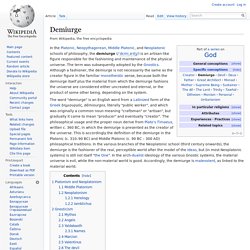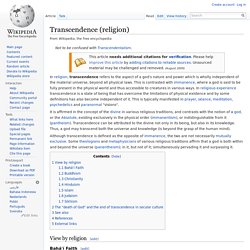

Demiurge. In the Platonic, Neopythagorean, Middle Platonic, and Neoplatonic schools of philosophy, the demiurge (/ˈdɛmiˌɜrdʒ/) is an artisan-like figure responsible for the fashioning and maintenance of the physical universe.

The term was subsequently adopted by the Gnostics. Although a fashioner, the demiurge is not necessarily the same as the creator figure in the familiar monotheistic sense, because both the demiurge itself plus the material from which the demiurge fashions the universe are considered either uncreated and eternal, or the product of some other being, depending on the system. Platonism and Neoplatonism[edit] Middle Platonism[edit] Transcendence (religion) In religion, transcendence refers to the aspect of a god's nature and power which is wholly independent of the material universe, beyond all physical laws.

This is contrasted with immanence, where a god is said to be fully present in the physical world and thus accessible to creatures in various ways. In religious experience transcendence is a state of being that has overcome the limitations of physical existence and by some definitions has also become independent of it. Tao Te Ching (Full Text)
Mormon Research. Phenomenology (philosophy) Phenomenology (from Greek: phainómenon "that which appears" and lógos "study") is the philosophical study of the structures of experience and consciousness. As a philosophical movement it was founded in the early years of the 20th century by Edmund Husserl and was later expanded upon by a circle of his followers at the universities of Göttingen and Munich in Germany. It then spread to France, the United States, and elsewhere, often in contexts far removed from Husserl's early work.[1] Phenomenology, in Husserl's conception, is primarily concerned with the systematic reflection on and study of the structures of consciousness and the phenomena that appear in acts of consciousness.
This ontology (study of reality) can be clearly differentiated from the Cartesian method of analysis which sees the world as objects, sets of objects, and objects acting and reacting upon one another. There are several assumptions behind phenomenology that help explain its foundations.